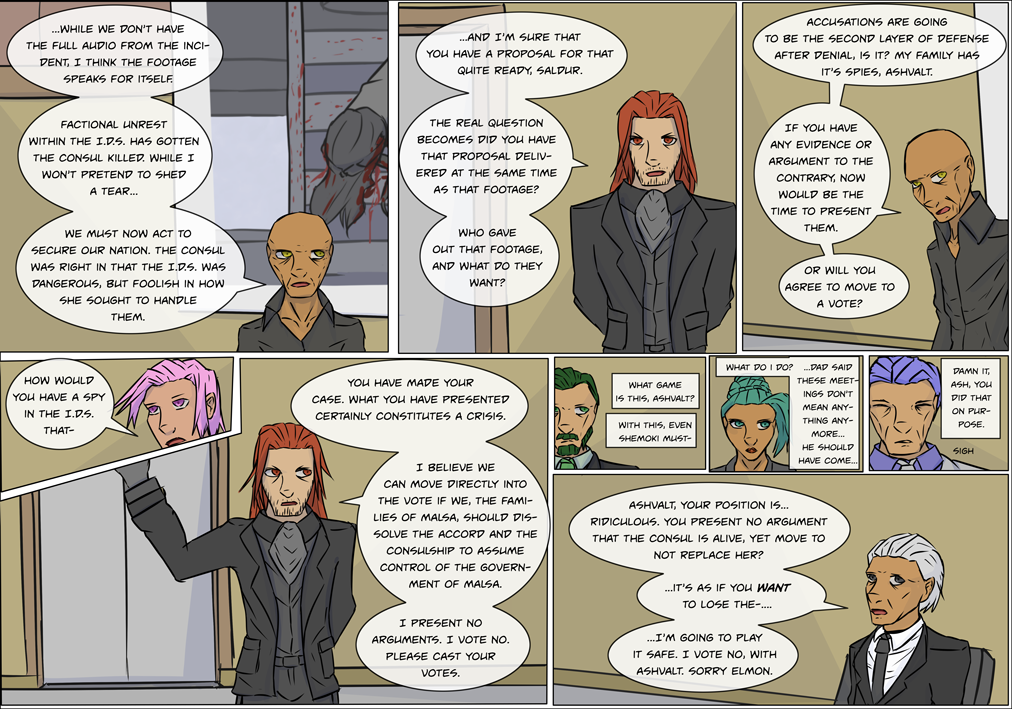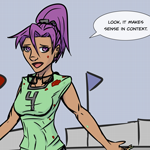Comic for Monday, December 23rd, 2019
Dec26
Reuploading.
The site was compromised yet again (or maybe still part of the same issue as last time). Nothing that really effects you folks besides the delay – they put up some subdomain to use for their phishing spam bullshit.
I will try to restore the comments later; will have to do that manually so will take a bit, and I’m back to work today.





Page will be a little delayed, but will be up this week. I do have some time off around New Years, but not tomorrow, so I ended up flipping my schedule a little and dealing with work stuff today. My schedule has been horribly confused by the Holidays and having weird split weeks.
Thank you for the update!
Enjoy your New Year’s Eve and we will see Peter and the ̶W̶o̶l̶f̶ gang in 2020!
By the way, has anyone looked at http://pastutopia.com/comic/comic-for-monday-june-24th-2019/. In that strip, Regin, Eliana, and Camilla all talked with the Consul. It seems likely that Camilla’s brother knows the situation.
If we assume that Ashvault knows and wants to fry all of the rogues in the plot to crispy bits and Regin is a member of the rogues but not in on the plot (but like to keep a few friends from committing suicide), that might change how things appear.
I think you probably wanted to name somebody other than Regin in your second paragraph. I mean, clearly Regin was in on the plot on the linked page.
The guy with white hair is Akatmar Shemoki, if that helps.
I meant that Regin wasn’t a participant in the plot, not that he didn’t know about the plot. Looking back, I understand the confusion.
Regin is at least very trusted. If he’s one of the family heads that they’re attempting to flush out here, then it’s probably safe to assume that they will only flush out family heads that are both friendly with some of the rogue families and not friendly with Regin.
I do understand that 2019 June 24’s update did show Regin as having some friction with Camilla, but that didn’t seem like an amount of friction that suggests to me that he’s probably a rogue. On chapter 15, page 2 and chapter 15, page 17, Regin played his plot roll well, though if he were secretly rogue he could manage to do that easily enough. His thoughts on chapter 15, page 18 seem consistent with being part of the plot, along with Ashvalt.
Admittedly, Ashvalt’s thoughts don’t seem to be what I’d expect for being in on the plot. However, given Ashvalt’s character depicted thus far, I can easily see Peter deciding that he was someone better kept out of the loop – he could be easily enough predicted, but has obvious tells such that someone who knew him would be able to see something was up if he wasn’t acting like this. And he wouldn’t be acting like this if he was really aware the consul’s death was faked.
Of course, I’m only guessing that he’s considered to not be a good actor because of his thoughts on that page. But I could be mistaken. I mean, there are times my own thoughts surprise me despite me being in on my own plots. If even I surprise myself, that Ashvalt surprises me sometimes should not surprise me.
My view is that there are four groups.
There are families that support the consul trying to produce some sense of order and actively back the consul.
There are the rogue families who have reservations about the consul but are not actively opposing her at this time. Consider them the “loyal opposition”. The rogue families are not concealing their opinion.
Then there are the secret plotters who are working with the IDS or other nations to further their own goals. They are concealing their plots, and may be publicly either supporting or questioning the consul.
There may also be some families that have declared themselves neutral in disputes between the rogue families and the loyal families supporting the consul. These are the people that Saldur and Elmon view as being too cowardly to take a stand, but can be influenced.
If you look at a Venn diagram, the loyal families, rogue families, and neutral families are probably exclusive groups, while the secret plotters can belong to any of these groups.
As I thought that I’d posted before, but apparently hadn’t: Maybe they go with “weakest votes first” so that they have a better chance of getting the weakest’s real opinions rather than just their agreement with the strongest?
(c.f. Courts Martial, at least in the RL Anglosphere [and in the ‘Star Kingdom of Manticore’ ^_^ ], where the judges vote in reverse order of rank for this same reason).
I believe you did, and it was a good post. Unfortunately it was one of the ones lost to the contamination of the site by miscreants.
Predicting the voting: This is made tricky by the fact that we don’t know for certain we even know of all of the people here. This page introduced a new person, just to stress that point.
votes cast:
Ashvalt: no
Akatmar: no
No brainers:
Saldur: yes
Elmon: yes
Regin: no
Ashian: no
Nydia: not a family head, per Chapter 14, page 43.
Less certain:
Saraine: yes
Chapter 15, page 1, panel 4, blue hair blue eyes woman: not a family head (I’m guessing here, based on her attire. She doesn’t look like she’s formally here.)
Chapter 15, page 1, panel 4, blue hair blue eyes man: no
Chapter 15, page 1, panel 4, red hair: yes, if she’s a family head. But she’s probably not a family head, given her role in the meeting thus far.
Chapter 15, page 2, panel 4: yes
Chapter 15, page 18, panel 13: no
Chapter 15, page 19, panel 7: swing
By my count, that’s 11 votes. 4 yes, 6 no, 1 undecided.
I might be mistaken about who exactly is a family head – for example, I’ve certainly been in situations where I had to dress up, but the guy who really mattered in the event went casual. But I’m guessing that it’s the guy with blue hair there who’s the family head, because the meetings I’ve been to that seemed to most resemble this tended to have the dress code be formal for anyone with a vote, and at most informal for those without. The ‘the person with the power goes casual’ seems to mostly happen when there are very few with power, and it’s actually a power move – a way of reminding everybody that unlike everyone else present, there’s nobody else there who can dictate their attire.
I’m also guessing about the guy introduced on page 18 being a head. His thought bubble reads like he personally has a vote, but that’s not explicitly stated, so he could just be thinking in first person because the group he’s participating in will be voting.
Considering that they have lots of disagreements with how things should be run, have some degree of a split between “old ways vs new ways,” and don’t necessarily have a lot of respect for each other or the group as a whole, I don’t know that dress code is the best indicator of rank.
My personal guess on rank would be who has a literal seat at the table vs who’s standing behind someone else.
Who is seated at the table probably could work well, except that we haven’t seen the whole table, and especially not after quorum was met. Also, I don’t think Arkvalt ever sat down. He *clearly* has a seat, but he hasn’t bothered to use it. And, as I’m thinking about it, the “hasn’t bothered to actually use their seat” has applied to multiple people at various meetings I’ve been in. Those not bothering to use their seat tend to be either decidedly for or decidedly against something, much like Arkvalt is here. They also tend to have enough clout that nobody else can make them sit down.
To a large extent, the game they are playing seems to be poker. Saldur thinks he has a straight flush and isn’t worried about the fact that Ashvault might have a royal flush. Ashvault wants people to think that he is bluffing, so they’ll put more in the pot. The fellow in the last frame has dealt with Ashvault in the past, so he views dealing with Ashvault the same way Peter’s friends view playing poker with Peter. He folds. Elmon also thinks he and Saldur have a straight flush, but suspects that Ashvault has something up his sleeve. (When dealing with magicians, that seems a reasonable proposition.) The others think that they are falling into a trap no matter what they do.
To be fair, the others are probably right. The mark of a good politician is to turn any loosing proposition for yourself into a loosing proposition for everyone else as well (even if there is no winning proposition for them). When you are stuck between two powerful persons there is no safe bet, you either allign yourself with one side or the other (hoping to pick the right one) or hope that the penalty from both sides for abstaining is less than the penalty would be for picking the wrong side. And remember, even if you pick the side that wins in the end, you can still be on the loosing side in the short term and still have to survive to the end to gain any benefits.
For the little guys it is truly a loose-loose situation.
In cases where there is no real difference between the two sides of an argument, and you just want to be on the winning side, I’d agree.
This isn’t one of those cases. If Saldur wins, life becomes more dangerous for everybody in this room. I’d think you’d need to be insane to vote ‘yes’ on this one, especially if you didn’t think you’d be top dog.
To be fair, I’m not sure that anybody in this room is sane. Ashian might be. But I think Ashvalt just proved that he isn’t.
I’m going to nitpick your word choice a bit. I think you described an effective politician, or maybe a person who is good at being a politician.
A good politician is a person that cares about their constituents (rare beast that it is).
I personally like the concept of a statesman, someone who actually wants what is best for the country.
I don’t think it would be appropriate for me to describe in public forum my definition of a “good politician”. 😉
I concur a good “statesman” applies to both Saldur and Ashvalt. As they both actively work for goals to “better” their country. The distinction between them is how they have defined “bettering their country,” but I suspect both could persuade most of us of their very valid positions.
Watching the consul’s “warmongering” upon gaining access to Mium info, I think, Saldur’s position may be one that we could all feel great empathy for, if it weren’t for our lack of background regarding his position.
Saldur may be more in favor of peace with all men, than the consul is. We don’t know. But there is a great deal of evidence that Saldur is aware of how dangerous these “interdimensional beings” are, and is actively trying to mitigate that danger with the knowledge and resources at his command. And if we consider how “in-the-dark” the consul was prior to Peter, how can we fault Saldur for thinking that the consul is going to get them all killed? And to prevent that eventuality, “better the death of one person for the well being of the country,” seems reasonable, if you grasp the firepower at the disposal of the IDS and their willingness to use it against Palindra.
I think ability to come up with a compelling argument to cast a chosen set of goals/positions as for the good of the country is a bit different than having it near and dear to heart. We don’t really know enough about any of them to know how much is posturing vs reality in that sense.
However, Ashvalt shushed a good question in terms of throwing suspicion on Saldur. How do you manage to slip a spy into an organization based in another dimension speaking a language they seem to try somewhat to avoid teaching Palindrans.
I’m less confident about Saldur’s good intentions. It’s my understanding that the old ways wasn’t more peaceful. Rather, before the old days, it was constant feuding between families, like in the background of Romeo and Juliet. Malsa was less frequently at war with other nations because it was always at war with itself. This was, incidentally, *not* better for the common Malsan citizen, although they were probably less afflicted by it than the lesser families and commoners in Romeo and Juliet’s background.
I do not believe anyone who would want to return to such a time could be considered a good statesman, given the definition Glider offered. I feel this is likely why Ashvalt felt he could get away with offering no arguments: the vote to return to the old ways *should* be a no brainer.
Hmm… I see. We are using the term “good” with different definitions. You are using the term with the antonym of “evil,” whereas I am using the term with the antonym of “incompetent.”
I say Saldur is a good (or excellent) statesman because he has a vision of how he wants his country to be “better.” And he constantly seeks to make informed decisions with the weight of his resources to change his vision into a reality. The same I hold to be true for Ashvalt.
You want to evaluate Saldur’s character and vision for conformity to your arbitration of good and evil. You have not explained why you should be arbiter of good and evil, but I will not put myself forward as an alternative arbitrator of such things.
I think you are incorrect as to Ashvalt’s purpose in calling the vote and establishing what is being voted upon. Depending on how Saldur (or whoever actually brought forward the vote) worded the vote, the vote may have been for a very different “thing” altogether. Ashvalt pre-empted that. Which, I think, was his purpose: To force a vote for dissolving, both, the Accord and consulship it established.
Seems a bit fungible in the statesman definition and not significantly different than politician at that point. The definition of making the country “better” might be that he gets to be the arbiter of women’s dress code and put all the attractive women in skimpy outfits and the unattractive women in burkas or something. That’s not better for the nation so much as tailoring it to his preferences. If you aren’t going to include good/evil and just effective/incompetent then I’m not sure where the distinction is. What constraints on “better” for the country do you consider up for consideration in your definition?
I’ll also say that I don’t think we really have enough info on history/background to know much about where these people are coming from individually and gauge things either.
I think your idea about Ashvalt trying to pre-empt a sliperier slope wording on a vote makes sense, but I also think he would’ve been better served to have noticed and pressed the “how did you get spies in an organization not based in this dimension speaking a language they want to avoid any of us learning” question.
I think I’m just fundamentally assuming Saldur has at least the slightest amount of empathy, and that he includes the citizens in what a country is. I’m questioning whether Saldur genuinely believes what he is wanting would actually improve the country, and feeling the answer is probably “no”. He just believes it would be better for him and his coalition.
I don’t take Saldur’s words at face value, because I feel like he’s the sort of person who would be working with the IDS to undermine Malsa’s current government and thus put the whole country in jeopardy, while accusing his political opponents of putting the whole country in jeopardy by opposing the IDS.
I do admit that it’s entirely possible that he’s not associated with the rogue faction that was responsible for aiding the IDS in their defense of their bases. If he’s not associated with that faction, then it’s entirely possible that he is a good stateman. But if he is involved with them, then he’s just a good politician.
I’m sure you’re right that Ashvalt absolutely chose to make the first vote for this thing rather than whatever Saldur was going to word the second vote as. (I say second, because Saldur’s first vote was on whether Malsa had a crisis going on.)
It’s my expectation that Saldur wasn’t even going to call a vote for anything like this. Rather, he was just going to assume, if they did have a crisis, that the next step would be to dissolve the Accord and his second vote would be for whatever happened after that.
If “no” wins here, anything that Saldur would have done next would be precluded. If “yes” wins here, the next status would be where Saldur was planning to start from.
Merry Christmas!
Thought bubbles on the last comic versus this comic make for some interesting thoughts.
That’s a lot of thinking.
Merry Christmas! Sorry you have to put up with that bullshit.